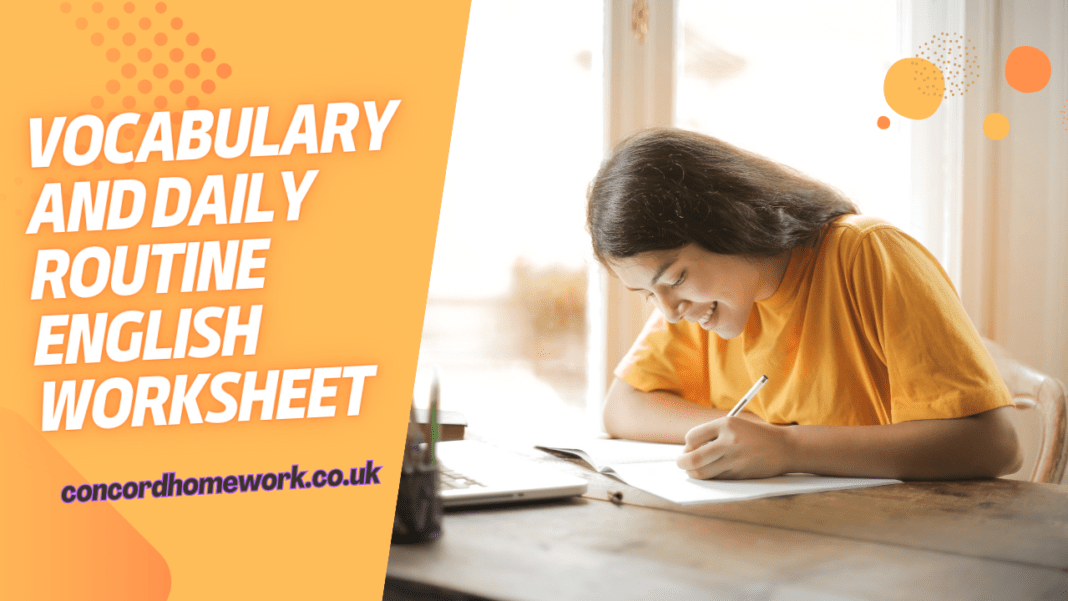Circle the action which people do first.
Complete the sentences with the verbs from the list.
Complete the article with have, go, or get.
Turn to the next page, read then listen and check.
This worksheet is about vocabulary and daily routine English worksheet. Students read, write, and listen to the texts. There is an answer key.
Mastering Daily Routine Vocabulary in English
Understanding and being able to describe your daily routine is a fundamental aspect of learning English. Below is a table that outlines key vocabulary, phrases, and example sentences related to daily routines. This guide is designed to be clear and practical, allowing learners to easily apply these structures to their own experiences.
| Activity | Vocabulary | Sentence Chunks | Example Sentences |
|---|---|---|---|
| Waking Up | alarm, stretch, yawn | I usually wake up at…, I wake up early/late | I usually wake up at 7 am. / I wake up early on weekdays. |
| Morning Routine | brush, shower, dress | After waking up, I…, Before breakfast, I… | After waking up, I brush my teeth. / Before breakfast, I take a quick shower. |
| Breakfast | cereal, toast, coffee | For breakfast, I have…, I eat breakfast at… | For breakfast, I have cereal and milk. / I eat breakfast at 8 am. |
| Commuting | drive, bus, walk | I commute to work by…, My commute takes… | I commute to work by train. / My commute takes about 30 minutes. |
| Work/School | start, finish, break | I start work at…, I have lunch at… | I start work at 9 am. / I have lunch at noon. |
| Lunch | sandwich, salad, eat out | For lunch, I usually have…, Sometimes I eat out at… | For lunch, I usually have a sandwich. / Sometimes I eat out at a nearby café. |
| Afternoon Activities | study, exercise, nap | In the afternoon, I…, I often take a nap after… | In the afternoon, I study English. / I often take a nap after lunch. |
| Evening Routine | cook, eat, clean up | I cook dinner at…, After dinner, I… | I cook dinner at 7 pm. / After dinner, I clean up the kitchen. |
| Leisure Time | read, watch TV, hobbies | In the evening, I like to…, My favorite hobby is… | In the evening, I like to read. / My favorite hobby is painting. |
| Bedtime | bed, read, sleep | I go to bed at…, Before sleeping, I… | I go to bed at 10 pm. / Before sleeping, I read for a bit. |
When writing or talking about your daily routine, you can use these sentence chunks as a template and fill in your specific activities. It’s also helpful to expand on these basics with additional details to make your description more vivid and personal.
For instance, instead of saying, “I have lunch at noon,” you could say, “I usually have lunch at noon, often opting for a healthy salad or a homemade sandwich.”
Remember, the key to effectively using this vocabulary is to practice regularly and incorporate these phrases into your daily conversations. This will not only help you remember the words but also improve your fluency in describing your daily life in English. Keep practicing, and you’ll master these routines in no time!
What should our team prepare for you?
What topics do you need?
“Thank you for taking the time to explore this topic with us! We hope you found the information helpful and insightful. Have any thoughts, questions, or additional examples to share? We’d love to hear from you in the comments below!
Don’t forget to spread the word by sharing this blog with your friends, family, and colleagues. Together, let’s continue to learn, grow, and connect with the world around us. Happy reading and sharing!”




















